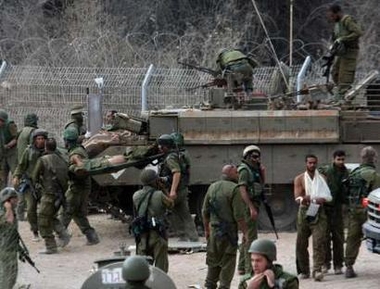JERUSALEM - Israel approved a massive new ground offensive into southern
Lebanon in an effort Wednesday to inflict further damage on Hezbollah and halt
most rocket attacks before the U.N. Security Council demands a cease-fire.

Israeli troops
transport injured soldiers to be evacuated from the Israel-Lebanon border
August 9, 2006. [Reuters] |
The decision came on the deadliest day of the war for Israeli troops in
Lebanon, with 15 soldiers killed. It coincided with mounting demands from the
international community for both sides to halt the fighting, which has killed at
least 829 people.
The plan to force Hezbollah guerrillas and their short-range rockets out of
southern Lebanon and past the Litani River would escalate the fierce fighting
there and, if successful, leave Israel in control of a security zone that it
evacuated six years ago after a bloody 18-year occupation.
A new Israeli offensive would also put tremendous pressure on the United
Nations to agree quickly on a cease-fire to end the fighting that has caused
widespread destruction across southern Lebanon and forced hundreds of thousands
of Israelis into bomb shelters. Israeli officials implied they would halt the
new offensive if a cease-fire agreement removes Hezbollah from the border.
In a televised speech, Hezbollah's leader taunted the Israelis.
"If you enter our land, we will throw you out by force and we will turn the
land of our invaluable south into your graveyard," Sheik Hassan Nasrallah said.
"We will be waiting for you at every village, at every valley. Thousands of
courageous holy warriors are waiting for you."
The White House said Wednesday neither Israel nor Hezbollah should escalate
their war. Press secretary Tony Snow said the U.S. message was for both sides.
Diplomatic efforts to reach a quick U.N. resolution faltered over differences
between Washington and Paris on an Israeli withdrawal from southern Lebanon.
France backed Lebanon's call for Israeli troops to pull out once hostilities
end, while the United States supported Israel's insistence on staying until a
robust international force is deployed. Lebanon has offered to send troops to
patrol the border region.
French President Jacques Chirac appealed for rapid agreement.
"The most immoral of solutions would be to accept the current situation and
give up on an immediate cease-fire," he said.
Nasrallah rejected a draft U.N. resolution that would temporarily let Israeli
troops remain in south Lebanon and take defensive action.
"The least we can describe this (draft resolution) is as unfair and unjust.
It has given Israel more than it wanted and more than it was looking for," he
said. He also signaled Hezbollah's intention to step up attacks, calling on
Israeli Arabs to leave the northern city of Haifa so Hezbollah could pound it
with rockets and not worry about killing fellow Muslims.
Israeli officials said their new offensive was meant to run parallel to the
cease-fire talks.
"Israel is still working for a diplomatic solution, preferably in the
Security Council," said Isaac Herzog, a member of Israel's Security Cabinet,
which voted Wednesday to approve the new ground offensive. "We cannot wait
forever, we have a million civilians living in bomb shelters, and we have to
protect them."
Other officials said privately that the offensive was aimed at pushing the
Security Council to take fast action, as well as to clear Hezbollah from south
Lebanon.
"The Israeli decision today is taken in absence of concrete steps by the
international community to deal with the situation in Lebanon. Such steps would
of course make an Israeli military operation superfluous," Foreign Ministry
spokesman Mark Regev said. "Israel understands fully that the real solution is
diplomatic."
A minister in Israel's Security Cabinet said the offensive might not begin
for two or three days to give more time to cease-fire talks, but senior military
officials said the operation could begin very quickly.